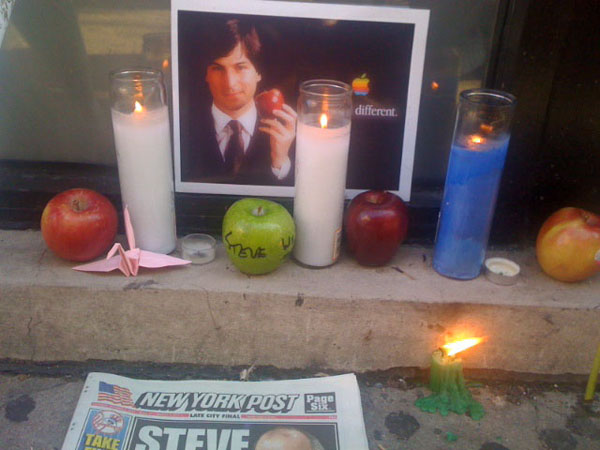Steve Jobs' Real Legacy Resides with Apple's Competitors

Get the world’s most fascinating discoveries delivered straight to your inbox.
You are now subscribed
Your newsletter sign-up was successful
Want to add more newsletters?

Delivered Daily
Daily Newsletter
Sign up for the latest discoveries, groundbreaking research and fascinating breakthroughs that impact you and the wider world direct to your inbox.

Once a week
Life's Little Mysteries
Feed your curiosity with an exclusive mystery every week, solved with science and delivered direct to your inbox before it's seen anywhere else.

Once a week
How It Works
Sign up to our free science & technology newsletter for your weekly fix of fascinating articles, quick quizzes, amazing images, and more

Delivered daily
Space.com Newsletter
Breaking space news, the latest updates on rocket launches, skywatching events and more!

Once a month
Watch This Space
Sign up to our monthly entertainment newsletter to keep up with all our coverage of the latest sci-fi and space movies, tv shows, games and books.

Once a week
Night Sky This Week
Discover this week's must-see night sky events, moon phases, and stunning astrophotos. Sign up for our skywatching newsletter and explore the universe with us!
Join the club
Get full access to premium articles, exclusive features and a growing list of member rewards.
Looking back at the colorful computers and sleek phones, one can easily mistake Apple Computers and Pixar as the legacy of Steve Jobs. That is not the case.
Most of his products sold poorly in comparison with their competitors and relied on others' inventions to do the heavy lifting. Jobs derived much of the original Macintosh graphic user interface from Xerox, he never designed a top-selling operating system, and no Pixar movie grossed more money than DreamWorks' "Shrek 2."
Instead, Job's legacy resides at Google, DreamWorks and Amazon, where envy of Apple's cultural cache drives up quality in the products actually used by a wide range of people.
"It's very important not to mistake Steve Jobs for someone who was important because of technological design," said Ken Perlin, a professor at the New York University Media Research Lab. "Apple is not a technology company. That's not what they're selling you. That's why I think Jobs was a towering genius of his time, but not for the reasons people generally think. Think of all the people who are going to go out and buy the new Kindle for $199 because they aspire to an iPad. That competitor wouldn't exist without Jobs. Apple changes everything around them by challenging them and raising the bar."
Inspiring Apple
To properly understand Jobs' legacy, one must disentangle the different phases of his career and the many fields Apple contributed to. Until Jobs' return to Apple as CEO in 1998, the company's computer sales languished amid the domination of Microsoft and IBM, and they lacked a presence in the increasingly important Internet sector.
In that moment, when Jobs regained control of Apple, his true talent came to the fore. Jobs couldn't code a useful program, design a useful invention or produce a product priced for the masses, but he could stir an optimism in consumers and colleagues alike, and create an aesthetic that today permeates even Apple's fiercest rivals.
Get the world’s most fascinating discoveries delivered straight to your inbox.
"Remember, Apple was in the dumps when Jobs came back to it. Apple released a lot of sh**** products, and I know they were sh**** because I owned them," said David Hounshell, a professor of technology and social change at Carnegie Mellon University. "Since Jobs came back the second time, it's been an aesthetic experience to even open the package."
Those two eras provide a case study in how Jobs succeeded more when he did less invention and more inspiration, Hounshell said. In 1987, Apple released the Newton, the first touch screen PDA. The product, developed at a time when Jobs took a much more hands-on role in the actual technological engineering, performed poorly with consumers and critics. Conversely, in 2007, at a time when Jobs shifted from hands-on invention to design inspiration, Apple released the iPhone, which changed the entire mobile industry with its success.
"Innovation is not synonymous with invention. There can be great inventions that don’t work out. Innovators have success regardless of where they get their idea. Jobs was that innovator," Hounshell told InnovationNewsDaily.
Inspired by Apple
That attitude change, more than any product or invention, saved Apple, and it spread throughout the technology landscape.
In 1998, a year after Apple's "Think Different" campaign began, a young startup called Google debuted a now iconic logo infused with the same design aesthetic seen in Apple products. By 2001, even Microsoft had gotten in on the act, releasing a Windows XP with Mac-like soft curves and color palette. Last week, Amazon debuted its Kindle Fire, a device that clearly emulates the iPad but costs a good deal less. The Fire, more than even the iPhone 4S, embodies the spirit Jobs leaves behind.
Apple might continue to produce interesting products, or it might find itself eventually foundering into insignificance without Jobs at the helm. Neither result will serve as a referendum on the genius of Steve Jobs. Craftily designed products from Google, Microsoft, DreamWorks, IBM, Dell, Sony and a host of other companies will carry on Jobs' legacy even as they aim to best offerings from the company he created.
"His talent was in identifying young talent, people who shared his techno-optimist Baby Boomer outlook that people had before everyone got depressed during Vietnam," Perlin told InnovationNewsDaily.
"It's not clear how much he could have done himself, but he had the ability to bring it out in others and steer them towards it. For a while there, the future was very depressing. It was all Ridley Scott and dystopia and John Carmack's DOOM, and then Apple came along and said, 'Hey, the future can be good, and shiny, and you can hold it in your hand.'"
This story was provided by InnovationNewsDaily, a sister site to Live Science. Follow InnovationNewsDaily on Twitter @News_Innovation, or on Facebook.
 Live Science Plus
Live Science Plus





